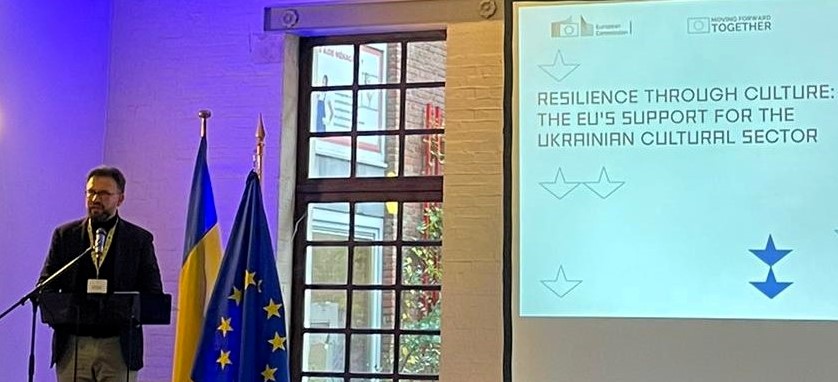On November 19 in Brussels, the Goethe-Institut, with support from the European Commission, organized the event “Resilience through Culture: The EU's Support for the Ukrainian Cultural Sector.” The gathering brought together Andrii Nadzhov, Deputy Minister of Culture and Strategic Communications of Ukraine, EU Member States representatives, and Ukrainian and European civil society organizations.
During the event, the European Commission Expert Group on Safeguarding Cultural Heritage in Ukraine presented its recommendations, which centre around four priority areas: recognising the value of cultural heritage, risk management and preparedness, monitoring and data collection, and the recovery of cultural heritage.

The expert group, established under the EU Work Plan for Culture 2023-2026 mandate, comprises 26 specialists, including six Ukrainian experts. Since 2023, the group has convened four times. These recommendations are addressed to the European Commission, Ukrainian authorities at all levels, and civil society organizations.
Devastating Cultural Losses: 457 Sites Damaged with $3.5 Billion in Damages
The report paints a stark picture of devastating cultural losses: as of October 2024, 457 cultural sites have been damaged or destroyed, according to UNESCO figures. “These include 143 religious sites, 231 buildings of historical and/or artistic interest, 32 museums, 33 monuments, 17 libraries, and 1 archive” the report informs, threatening not just physical structures but the very fabric of Ukrainian cultural identity.
The economic toll is equally profound. A joint exercise conducted by UNESCO, the World Bank, the EU, and the Ukrainian government reports that the culture and tourism sector has registered damage amounting to $3.5 billion, with projected losses reaching $19.6 billion. It is estimated that nearly $9 billion will be needed over the next decade to enable cultural sector recovery.
A European Commission-led expert group has released comprehensive recommendations highlighting the critical importance of protecting Ukraine the country’s cultural legacy during these tumultuous times.
A European Commission-led expert group has released comprehensive recommendations highlighting the critical importance of protecting Ukraine the country’s cultural legacy during these tumultuous times.
The group of experts proposes to strengthen the digital infrastructure and human capital will drive innovation, job creation and the return of professionals over time. It also underlines the need for the definition and establishment of quality requirements and standards both for education and training
provision (skills) and for the recognition of professional qualifications (competencies) should be aligned with EU standards and frameworks and international best practices.
“Existing international documents, such as the Warsaw Recommendation on Recovery and Reconstruction of Cultural Heritage (10), should guide the process, prioritising community needs” writes the report.
The expert group highlights the need for an inclusive approach. It advocates for decision-making processes that involve community members, especially those most affected by the conflict.
“Cultural heritage is an asset that reaches beyond signatory monuments and sites and provides resources for (re)construction, social life, continuity, identity and meaning-making”. The Expert Group emphasises that heritage conservation should be holistic, involving multiple perspectives and stakeholders. The principles prioritise the recognition of cultural heritage as a living, dynamic resource that goes beyond physical monuments and serves as a critical tool for community resilience, identity reconstruction and social healing.
The recommendations stress the importance of inclusive decision-making processes that involve local communities, professional associations and diverse stakeholders. They advocate a cross-sectoral approach that links heritage conservation with broader social, economic and psychological recovery efforts.
It sees cultural heritage not just as a remnant of the past, but as a vital resource for Ukraine's future development, peace-building, and national regeneration. The approach is deliberately ambitious, aiming to set high standards for the comprehensive protection of cultural heritage in war-affected regions.
EU Commission's New €5 Million Creative Europe Call For Ukraine
Since Russia's invasion began over two years ago, the European Commission has invested more than €35 million to support Ukraine's cultural and creative sectors. The Commission has now launched a second €5 million call for proposals under its Creative Europe programme. This initiative will fund three projects that focus on distinct objectives.
The first aims to support Ukrainian artists and cultural organizations both within Ukraine and other Creative Europe countries. The second seeks to ensure that displaced people in Ukraine and Creative Europe countries can access culture and cultural heritage. The third project will focus on planning the post-conflict restoration of Ukraine's cultural and creative sectors.
--
The full recommendations are available on the European Commission's Publications Office website, providing a detailed roadmap for cultural heritage preservation in Ukraine. Follow the link to download.
Image I: Григорій Мазур / АрміяInform - Незцілені рани Сіверського краю, CC BY 4.0
Image II: Andrii Nadzhos, Deputy Minister of Culture and Strategic Communications of Ukraine for European Integration, EUNIC, X.com









